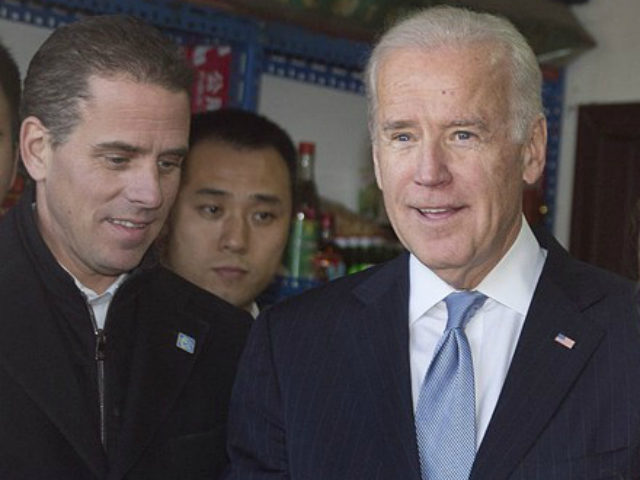Bohai Harvest RST (BHR), a private equity firm bankrolled by the Chinese government, is weighing how and if it should explain its relationship with Hunter Biden, the youngest son of former Vice President Joe Biden.
The company, which is one of China’s largest mutual fund management firms, told the South China Morning Post it was “working to produce an explanation” about the younger Biden’s “role.” The announcement comes as BHR has found itself under scrutiny after President Donald Trump called for the Chinese government to investigate its ties to the Biden family.
Trump, who is facing an impeachment inquiry in Congress for suggesting Ukraine launch a similar probe into Hunter Biden’s dealings in the eastern European country, in particular has noted the timing of BHR’s creation could have posed a conflict of interest with Joe Biden’s duties as vice president.
As Peter Schweizer, senior contributor at Breitbart News, revealed in his bestselling book — Secret Empires: How the American Political Class Hides Corruption and Enriches Family and Friends — Hunter Biden inked the multibillion dollar deal that created BHR in 2014 with a subsidiary of the state-owned Bank of China in 2013. The deal, which was the first of its kind, created BHR as a private equity fund to invest Chinese money overseas.
The timing of the lucrative deal has been brought into question as it came only 12 days after Hunter visited China with his father aboard Air Force Two. Officially, the then-vice president was visiting the country amid escalating tensions over islands in the South China Sea and decided to bring his granddaughter and son along. In a March 2018 interview with Breitbart News Tonight, however, Schweizer detailed the political machinations that preceded Hunter Biden’s $1.5 billion venture with China:
“In December of 2013, Vice President Joe Biden flies to Asia for a trip, and the centerpiece for that trip is a visit to Beijing, China. To put this into context, in 2013, the Chinese have just exerted air rights over the South Pacific, the South China Sea. They basically have said, ‘If you want to fly in this area, you have to get Chinese approval. We are claiming sovereignty over this territory.’ Highly controversial in Japan, in the Philippines, and in other countries. Joe Biden is supposed to be going there to confront the Chinese. Well, he gets widely criticized on that trip for going soft on China. For basically not challenging them, and Japan and other countries are quite upset about this.”
Since its creation, BHR has invested heavily in energy and defense projects across the globe. As of June, Hunter Biden was still involved with BHR, sitting on its board of directors and owning a minority stake of the fund estimated to be worth more than $430,000.
Apart from the shadowy timing of BHR’s inception, the company and Hunter Biden have also caught the eye of investigators in Congress for the purchase of a U.S. company with insight into military technology.
In 2015, BHR and the Aviation Industry Corporation of China (AVIC) — an aerospace and defense conglomerate owned and operated by the Chinese government — made a $600 million bid to purchase Henniges, a Michigan-based automotive company. The sale required approval from the Obama-Biden administration’s Committee on Foreign Investment in the United States (CFIUS) as AVIC was a subsidiary of the Chinese government and Henniges produced “dual-use” anti-vibration technology with U.S. “military applications.” CFIUS, which is made up of representatives from 16 different federal bodies including the Departments of State, Treasury, and Defense, is required to review any transaction with national security implications.
When the AVIC and BHR’s bid was first announced, alarm bells went off in certain sectors of the defense industry. In particular, many noted that AVIC was “reportedly involved in stealing sensitive data regarding the Joint Strike Fighter program,” which it later “reportedly incorporated … into China’s J-20 and J‑31 aircraft.”
Despite the national security concerns, CFIUS approved the deal with AVIC, purchasing 51 percent of the company while BHR took ownership of the other 49 percent. Upon purchase, an industry newsletter stated the deal was the “biggest Chinese investment into US automotive manufacturing assets to date.”
Although the deal was approved by the Obama administration, it has not escaped congressional scrutiny. In August, Senate Finance Committee Chairman Chuck Grassley (R-IA) launched a probe into whether or not the CFIUS decision was influenced by either Joe Biden or former Secretary of State John Kerry, whose stepson was also involved in the venture.
“The direct involvement of Mr. Hunter Biden and Mr. Heinz in the acquisition of Henniges by the Chinese government creates a potential conflict of interest,” Grassley noted when launching the probe.
Despite the appearance of conflicts of interest, the Chinese government announced on Tuesday it would not probe into BHR or Hunter Biden’s ties to the company.

COMMENTS
Please let us know if you're having issues with commenting.